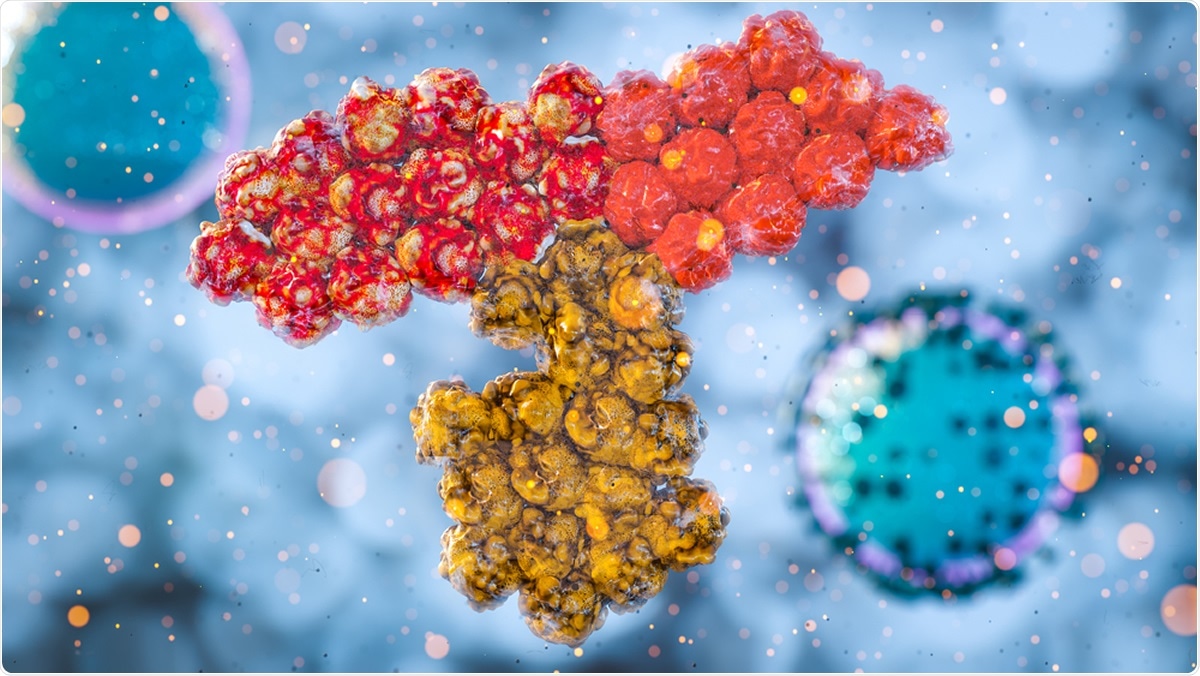Coronaviruses are a large family of viruses that can infect both animals and humans. They are a respiratory virus named for the crown-like spikes on their surface. These viruses are culprits in several outbreaks across the globe.
Now, a new study shows that some people have immune responses against the severe acute respiratory syndrome coronavirus 2 (SARS-CoV-2), the virus that causes COVID-19, thanks to how the body reacted the last time it caught a cold. This means that even if a person has not been exposed to the novel coronavirus, the body has a memory of it and can trigger an immune response to fight the infection.

Antibody SARS COV-2 immune response. Image Credit: CI Photos / Shutterstock
Common colds
The researchers from the La Jolla Institute for Immunology (LJI) have found that previous infections with common cold viruses KHU1, OC43, NL63, and 229E can train the immune system to detect and recognize SARS-CoV-2.
Published in the journal Science, the study highlights the power of the immune system to protect against infection and illness. The team revealed that immune cells, called T cells, which can spot common cold coronaviruses, can recognize the specific sites on the virus, such as the “spike” protein. This type of protein is used by the virus to bind and invade healthy human cells.
The study
To arrive at their findings, the team used human blood samples before SARS-CoV-2 was discovered in December 2019. From there, they mapped 142 T cell epitopes across the SARS-CoV-2 genome to help facilitate precise interrogation of the SARS-CoV-2-specific CD4+ T cell repertoire.
“We demonstrate a range of pre-existing memory CD4+ T cells that are cross-reactive with comparable affinity to SARS-CoV-2 and the common cold coronaviruses HCoV-OC43, HCoV-229E, HCoV-NL63, or HCoV-HKU1. Thus, variegated T cell memory to coronaviruses that cause the common cold may underlie at least some of the extensive heterogeneity observed in COVID-19 disease,” the researchers concluded in the study.
The team also found that 40 to 60 percent of people who were never exposed to SARS-CoV-2 had T cells that reacted to the virus. The immune systems of these people recognized fragments of the virus it had never seen before, which may explain why some develop only mild symptoms and why some are asymptomatic.
Despite the promising results, the researchers said that further research and data collection are still needed to arrive at a more conclusive result.
“We have now proven that, in some people, pre-existing T cell memory against common cold coronaviruses can cross-recognize SARS-CoV-2, down to the exact molecular structures. This could help explain why some people show milder symptoms of the disease while others get severely sick,” Daniela Weiskopf, LJI Research Assistant Professor, said.
Meanwhile, Professor Alessandro Sette, study co-author, said that immune reactivity might translate to various levels of protection. In people with a robust T cell response, they have the chance to mount a faster and more robust response against the virus that causes COVID-19.
Global situation of COVID-19
Understanding the mechanism of SARS-CoV-2 can help scientists develop treatments and vaccines against the coronavirus pandemic. These studies can help hasten the discovery of therapeutics to contain the spread of the deadly virus that has killed more than 731,000.
The coronavirus pandemic has now reached 188 countries and territories, infecting 19.86 million people. The United States remains as the country with the highest number of confirmed cases, reporting more than 5 million cases and more than 162,000 deaths. Brazil and India report high transmission rates, with more than 3 million and 2.2 million confirmed cases, respectively.
Of these, the official tally has confirmed more than 11.96 million recoveries from SARS-CoV-2 infection. The WHO has said that the new epicenter of the pandemic is in the Americas. South America’s Brazil, Peru, Colombia, and Chile report the high numbers of confirmed cases.
Sources:
Journal reference: